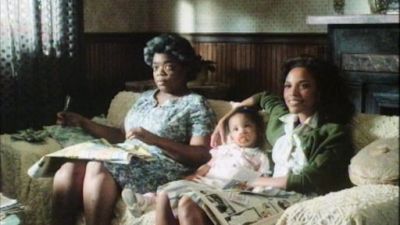Note: If you wish to receive, via e-mail, (1) my weekly newsletter or (2) daily copies of these posts, notify me at rrbates1951@gmail.com and indicate which you would like. I promise not to share your e-mail address with anyone. To unsubscribe, send me a follow-up email.
Friday
Yesterday I discussed how much I admired Kitty in Anna Karenina for nursing her dying brother-in-law, despite the objections of a husband that wants to protect her from all unpleasantness. Today I write about another woman who will not be denied her place by someone who is dying. Such literature inspires us by showing how life insists upon itself, despite all obstacles.
The character I have in mind is Mattie Michael in Gloria Naylor’s The Women of Brewster Place. The novel is a series of stories about Black women who live in an urban cul-de-sac, and Mattie has had her share of troubles, from being beaten by her father and leaving home for an out-of-wedlock pregnancy to losing this son years later when he jumps bail following a manslaughter charge. Having known such sorrow, she doesn’t hold back when her next-door-neighbor is close to death.
Ciel has lost her baby girl after the child electrocutes herself by sticking a fork in a socket. Ravaged by grief, she decides to die herself, refusing all food and drink:
People had mistaken it for shock when she refused to cry. They thought it some special sort of grief when she stopped eating and even drinking water unless forced to her hair went uncombed and her body unbathed. But Ciel was not grieving for Serena. She was simply tired of hurting. And she was forced to slowly give up the life that God had refused to take from her.
While others, somewhat like Kitty’s Levin, shy away from what they’re seeing, Mattie does not. Instead, she charges in, refusing to let death have dominion:
Mattie stood in the doorway, and an involuntary shudder when through her when she saw Ciel’s eyes. Dear God, she thought, she’s dying, and right in front of our faces.
“Merciful Father, no!” she bellowed. There was no prayer, no bended kneed or sackcloth supplication in those words, but a blasphemous fireball that shot forth and went smashing against the gates of heaven, raging and kicking, demanding to be heard.
“No! No! No!” Like a black Brahman cow, desperate to protect her young, she surged into the room, pushing the neighbor woman and the others out of her way.
Like Kitty with Levin’s brother, Mattie instinctively knows what the occasion calls for as she takes Ciel in her arms:
She sat on the edge of the bed and enfolded the tissue-thin body in her huge ebony arms. And she rocked. Ciel’s body was so hot it burned Mattie when she first touched her, but she held on and rocked. Back and forth, back and forth—she had Ciel so tightly she could feel her young breast flatten against the buttons of her dress. The black mammoth gripped so firmly that the slightest increase of pressure would have cracked the girl’s spine. But she rocked.
Perhaps there’s a slight echo of Walt Whitman’s “Out of the Cradle Endlessly Rocking” here because the rocking takes on archetypal dimensions. Mattie becomes that force which, through the long history of human suffering, provides a comfort so deep as to keep the race keeping on:
Ciel moaned. Mattie rocked. Propelled by the sound, Mattie rocked her out of that bed, out of that room, into a blue vastness just underneath the sun and above time. She rocked her over Aegean seas so clean they shone like crystal, so clear the fresh blood of sacrificed babies torn from their mother’s arms and given to Neptune could be seen like pink froth on the water. She rocked her on and on, past Dachau, where soul-gutted Jewish mothers swept their children’s entrails off laboratory floors. They flew past the spilled brains of Senegalese infants whose mothers had dashed them on the wooden sides of slave ships. And she rocked on.
And in that comfort, which passeth all human understanding, she finds her way to the heart of the pain:
She rocked her into her childhood and let her see murdered dreams. And she rocked her back, back into the womb, to the nadir of her hurt, and they found it—a slight silver splinter, embedded just below the surface of the skin. And Mattie rocked and pulled—and the splinter gave way, but its roots were deep, gigantic, ragged, and they tore up flesh with bits of fat and muscle tissue clinging to them. They left a huge hole, which was already starting to pus over, but Mattie was satisfied. It would heal.
And Ciel does heal. First she retches (“After a while she heaved only air, but the body did not seem to want to stop”), which Naylors describes as “exorcising the evilness of pain.” Then Mattie gives her water, gently bathes her, and wraps her in a clean sheet. The session ends in healing tears:
And Ciel lay down and cried. But Mattie knew the tears would end. And she would sleep. And morning would come.
Dylan Thomas counseled us not to go gentle into that good night but to “rage and burn” at the approach of death. When Julia and I lost our Justin, I was like King Hrethel in Beowulf, who crawls into bed when he loses his eldest son, never to emerge, but Julia insisted on life. I still remember, the morning after, going out at dawn into the grass by the inlet close to our house and lying together in the wet grass. Although our grief shook us to our core, she insisted that we keep going.
And we have.


